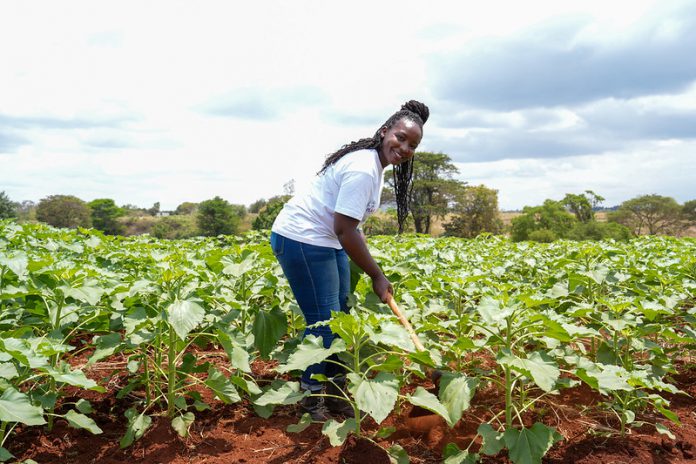NAIROBI, Kenya, Oct 8 — The increasing awareness of global warming and the contribution to environmental degradation has fueled a growing interest in ecopreneurship among young men and women in Kenya.
In recent years, Kenya has seen a notable shift towards sustainability with countries worldwide recognizing the importance of adopting eco-friendly business practices to mitigate the adverse effects of human activities on the planet.
By consciously addressing environmental and social challenges and offering innovative solutions, entrepreneurs are shaping the future of sustainable business practices in the country, with the aim of developing businesses that not only generate profit but also have a positive impact on the environment.
Linda Kamau, a young entrepreneur in Embu, upon recognizing the urgency of solving the climate change issue in the area, explored use of renewable energy sources to offer affordable irrigation services to low-income farmers.
Linda is a co-founder of SowPrecise, an organization focused on optimizing farming operations in Kenya by harnessing advancements in agricultural technology and sharing essential resources.
He initiative dubbed SunRider features a cost-effective solar-powered irrigation system tailored specifically for the low-income farmers in the area.
Per-use-service
SunRider works in a per-use-service charging farmers a small fee to access SunRider facilities offered to farmers on demand.
Linda says what inspired SunRider is that they had identified that low-income farmers in Embu had a problem to accessible and affordable solar power irrigation systems.
She says the use of SunRider solar power irrigation system replaces diesel-powered irrigation systems mitigating about 1.28 metric turns of Carbon dioxide absorbed by 59 mature trees in one year.
“As SunRider we don’t expect low incoming farmers to own an expensive power irrigation system, we just need them too pay a small fee to pay the irrigation system and because it is modular, we are able to advance parts of SunRider as needed and we are able to recycle and dispose part of it in an economic convey,” Linda says.
As Co-Founder of SowPrecise, Linda started a demo-farm in Embu to act as a laboratory to test and show farmers in the area the use of the SunRider solar panel system irrigation as a game changer in food generation and eco-entrepreneurship.

Innovative approaches
The farm has a section of different food crops planted and watered using rain horses instead of normal irrigation canal system which leads to soil erosion.
The solar panels are connected to powerful batteries that store the energy generated from the sun to pump water from Nyamindi River in Embu to irrigate 20 acres of land.

“This is a demo project and it is pretty new we are still testing the equipment, we have five farmers already using the SunRider solar energy irrigation system including our demo farms and therefore in total we serving 32 acres of land,” she says.
Linda says the project is planning to grow the number of farmers to 30 within the first half of next year who will be able to have SunRider solar panel irrigation system full time.


Linda says the major problem they have encountered in the implementation of the project is mobility in moving the panels from one farm to another since the solar panels, about 1metre by 2metres, wheigh about 25kgs.
To mitigate risks the team considered a hydraulic system to automate the retraction of the solar panel to reduce any introduction of human error.
Linda said donations and grant funding were key to de-risk the high cost of funding the solar panels and debt financing.


Linda’s organization, SowPrecise, in 2023, received a grant of Sh3.6million ($30,000) from the Young African Leaders Initiative (YALI), along with technical support to enhance their organizational structures and processes and assist smallholder farmers in the community.
YALI, an initiative of the United States government, seeks to offer a range of dynamic learning experiences designed to equip young African leaders with the skills and knowledge they need to drive change in their communities.
United States Agency for International Development (USAID) Kenya and East Africa Mission Director David Gosney, speaking during a visit to the pilot project said the initiative offers solutions to key challenges including unemployemnt.
“It is an opportunity to create employment to the youth, the community and even ensure the project puts money into the pockets of the low-income farmers and transform their lives.”
Sustainability
He said the technology demonstrated by Linda has the potential to reduce the cost for irrigation by 80 per cent which will help bring prosperity and meaning of life to the youth and families in the area.

Gosney said that the YALI programme aims to drive a sustainable movement in equipping young people with skills to bring change in the society.
“The climate change is here and the impact is felt and the communities need to be more resilience to ensure there is really enough by increasing productivity in the area and lower the cost of resources to be more productive,” he said.
One of the farmers, Lawrence Gakuru, who is a beneficiary from the project, says the solar farming irrigation is cheaper as the cost is effective than petroleum.
He said the government should come to give better solar panels and better batteries for irrigation system and lower the tax on solar power irrigation system thus enabling them increase their productivity.


“We urge the Ministry of Agriculture to think about how to improve the farmers welfare to get good productivity using the sun and maximize o their profitability,” Gakuru said.
Despite the availability of grid power supply in the area, the cost of installation to the farmers’ farms for irrigation remains costly compared to solar energy.
Continued growth in eco-entrepreneurship in Kenya marks a significant step towards sustainable development and mitigation of climate change.
To ensure long-term success, a holistic approach involving education, entrepreneurship culture, research institutions, and government intervention ishowever necessary.
Source: capitalfm








